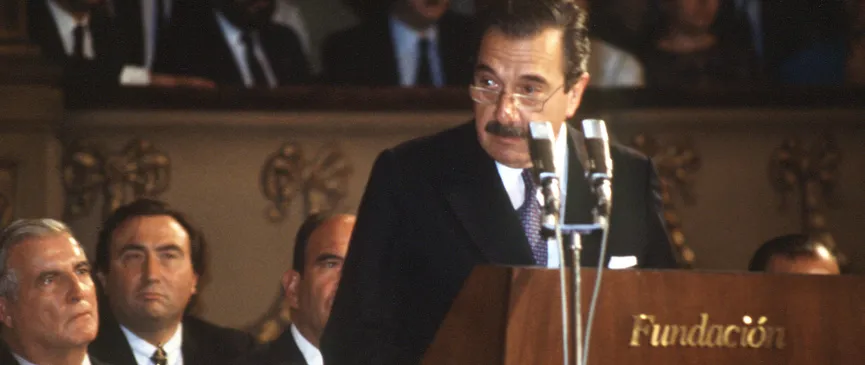Main content
Raúl Alfonsín Prince of Asturias Award for International Cooperation 1985

Raúl Alfonsín Foulkes (Chascomús, Buenos Aires, Argentina, 1927 – Buenos Aires, Argentina, 2009), president of Argentina from 1983 to 1989, he was the child of a Galician father . His secondary education was at the General San Martin military academy, from which he passed out as a second lieutenant of the reserve. He then began his legal training, graduating in law from the National University of Buenos Aires in 1950.
At eighteen years of age he began his political activism in the "Renovación y Cambio" ("Renewal and Change") movement of the Radical Civic Union (UCR). In 1952 he was elected as a councillor for his home town, and the following year became vice-chairman of the group of Radical deputies in the provincial parliament. In 1960 he gain became a provincial parliamentary deputy, and two years later would obtain the presidency of the party´s Buenos Aires provincial committee. Elected as a national member of parliament in 1963, in the same year he became chairman, until 1972, of the Radical Civic Union of Buenos Aires province. In 1971 he founded the Renewal and Change Movement, an internal sector of the Radicals with a more progressive political line. Disagreements arose with the chairman of the party, Dr Ricardo Balbín, and Alfonsín lost his first battle against him in the internal elections of the Radical Civic Union for the candidacy for President of the Nation in 1973.
In 1975, Alfonsín participated in the foundation of the Permanent Assembly for Human Rights, while paramilitary groups were committing bloody attacks upon public liberties. As a lawyer of the Association, he defended those detained by the military regime, as well as signing pleas of "habeas corpus" complaining against the disappearance of people.
He was one of the few Argentine political leaders who did not support the military occupation of the Malvinas led by General Leopoldo F. Galtieri in April 1982. Around this time, Alfonsín made various journeys to Europe and the United States in search of support for the re- establishment of democracy in Argentina. In the general elections held on the 30th october 1983, Alfonsín was elected with 52% of the votes. As president of the nation he had to overcome serious obstacles in order to consolidate the democratic system. His first decision in government was to order the opening of legal proceedings against the leaders of the political repression imposed in the Seventies, which caused great unease in he ranks of the armed forces. In 1986, while he was visiting the military bases in Cordoba, he there was an attempt on his life, from which he escaped unharmed. He had to face other attempted military rebellions at Easter 1987 and in January 1988. His objectives, in any case, had been attained: on the 9th November 1985 a civil court condemned the ex-Presidents Jorge Videla and Roberto Viola, Admirals Emilio Massera and Armando Lambruschini and Brigadier Ramón Agosti.
His term of office as president ended in 1989, following which Peronist Carlos Menem became head of the country. Alfonsín then continued his political career in the opposition, subsequently standing for president in 1993 without success.
Alfonsín received numerous prizes and distinctions for his committed work in defence of democracy. Among these are the title "Man of the Americas" fromthe Pan-American Development Foundation, the International Prize for Democracy, 1984 "Man of the Year" from the Organization of American States and the Council of Europe Awards for Human Rights.Among other honours he holds the Grand Cross of Isabella the Catholic, which he was granted by the Spanish government in June 1984, during his first official visit to Spain.
Raúl Alfonsín is the author of the books, La cuestión argentina, El radicalismo and Ahora, mi propuesta polítca.
End of main content
